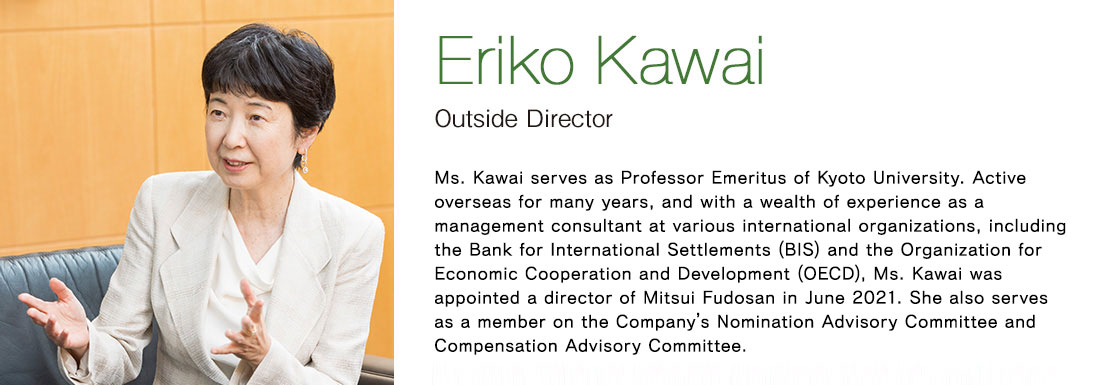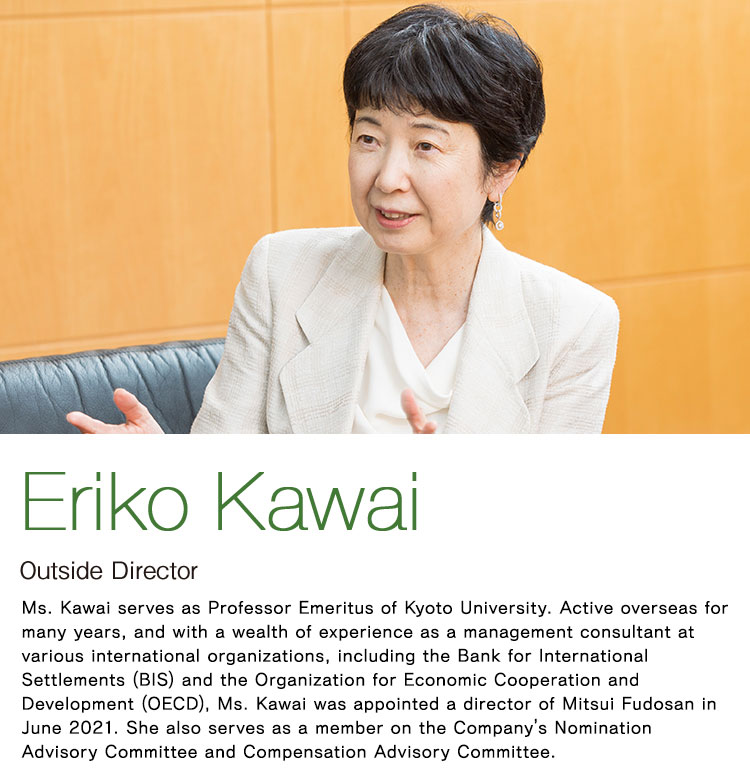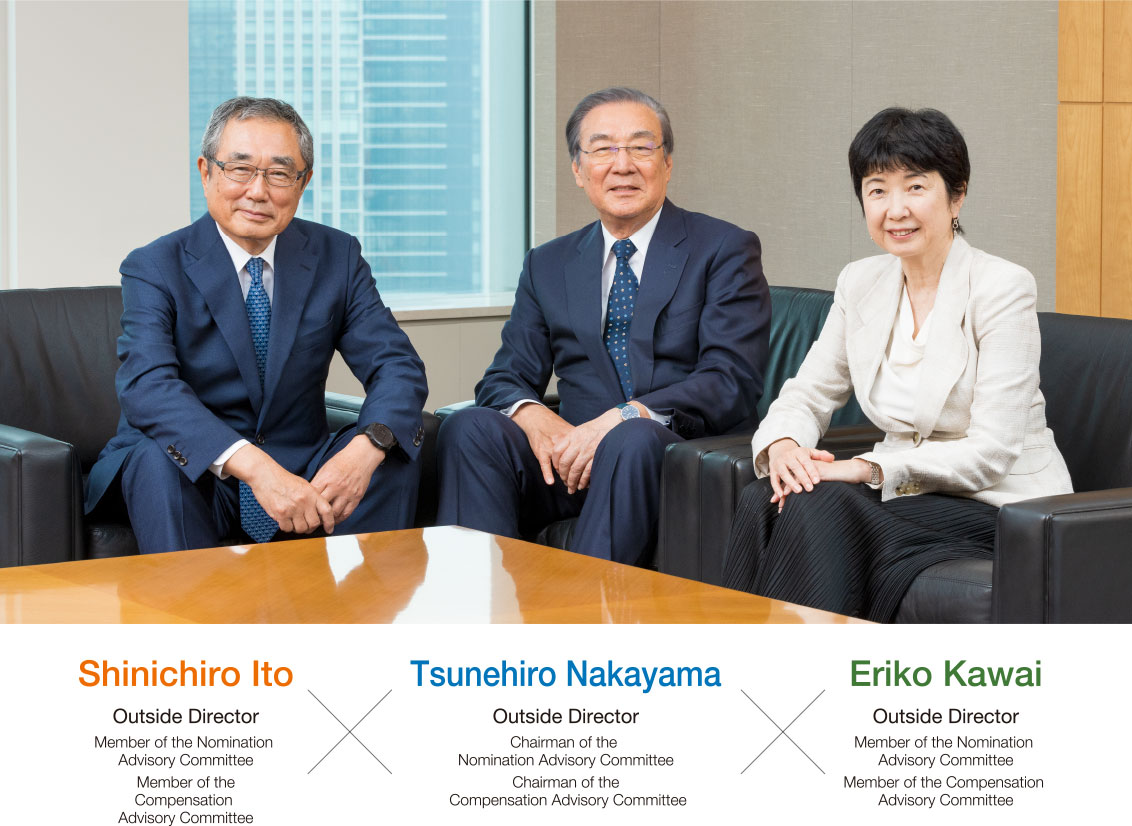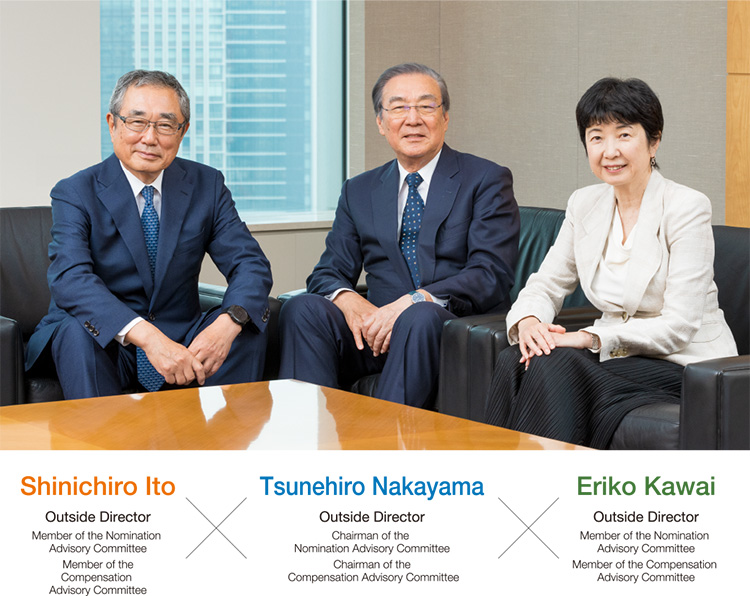A roundtable discussion was held among three outside directors (Tsunehiro Nakayama, Shinichiro Ito, and Eriko Kawai) on such topics as the Board of Directors’ efficacy, issues as they relate to sustainable growth, initiatives aimed at promoting decarbonization and D&I, and expectations toward the Company’s new structure following a change in the President. Details are presented as follows.
Evaluation of the Board of Directors’ Efficacy / The Provision of Information to Outside Directors
Ito|The site tour at TOKYO MIDTOWN YAESU was an excellent opportunity to gain confidence in the Company’s strengths and business direction. Against the backdrop of an increasingly competitive office building leasing market, the chance to see this large-scale property with all of its floors under contract, and the transformation of an entire city brought to fruition, helped to confirm in my mind the Company’s strengths and its efforts to create neighborhoods that get better with age with an eye to the future.
Nakayama|I could not agree more. Initially, I found it difficult to grasp many of the Company’s concepts, including the creation of neighborhoods, getting better with age, and real estate as a service. Visiting TOKYO MIDTOWN YAESU and Kashiwa-no-ha Smart City, and experiencing each property firsthand, allowed me to gain a deeper understanding while completely transforming the image I had of neighborhood creation. From personal experience, on-site visits are essential to understanding the Company’s business concepts. The notions of getting better with age and real estate as a service have yet to gain widespread acceptance within society. For this reason, Mitsui Fudosan should ramp up its endeavors to promote each concept in the future.
Kawai|That’s true. The concept of getting better with age accurately conveys the Company’s goal of creating neighborhoods and embodies every facet of sustainability itself. In addition to TOKYO MIDTOWN YAESU, I visited the Nihonbashi area last year. Actually seeing the site and experiencing what kind of space was being developed and the thought that went into the development plans was far more rewarding than just looking at a map and learning about the project from my desk.
Overview of the Company’s Fiscal 2022 Financial Results and Issues
How do you evaluate the Company’s fiscal 2022 financial results, and are there any issues that you feel need to be addressed for the Company’s future sustainable growth?
Ito|I believe the Company’s fiscal 2022 financial results were impressive. Impacted by COVID-19, the Hotels and Resorts as well as Retail Properties businesses continued to face a harsh operating environment. Against this backdrop, Mitsui Fudosan should be commended for its success in placing each of these businesses on a recovery track and securing a certain degree of Group-wide profit growth. In relative terms, I believe the real estate sector is resilient to pandemics and is less susceptible to the rapid deterioration in financial results attributable to changes in the market environment. Although the first half of fiscal 2022 was still challenging, successful steps were taken to adjust positively to COVID-19. From fiscal 2023, I am confident that Mitsui Fudosan will demonstrate further growth and work positively toward achieving the numerical targets identified in its VISION 2025. Turning to the Company’s overseas business, the external environment is undergoing wide-ranging change. In the United States, for example, this includes rising interest rates against the backdrop of rapid inflation. Despite this difficult operating environment, leasing at 50 Hudson Yards in New York continues to progress favorably free from any major negative factors. I believe this clearly differentiates this property and Mitsui Fudosan from the market. While geopolitical risks and future interest rate trends in Japan will require close attention, I am confident that the Company as a whole is more than capable of overcoming any hurdles.
Nakayama|Mitsui Fudosan’s domestic Hotels and Resorts business as well as Mitsui Car Park Leasing have indeed struggled over the past two to three years. Over the long-term span of a decade, however, I believe these difficulties have helped strengthen the Company’s business platform going forward. Historically, Mitsui Fudosan enjoyed steady growth in line with trends in its external environment. In contrast, the Company initiated steps to reform its business model and revise its earnings structure owing to COVID-19 with an eye on the post-pandemic period. Taking the aforementioned into consideration, results in fiscal 2022 reflect the fruits of these endeavors. Amid expectations of significant growth in inbound tourism, the fact that the Company took these steps to strengthen its management foundation in response to COVID-19 will hold it in good stead to capitalize on potential business opportunities as they arise. In this regard, I rate highly Mitsui Fudosan’s ability to turn adversity into an opportunity for growth. Turning to mature real estate markets, focusing largely on Europe and the United States, the Company’s decision to adopt a “when in Rome do as the Romans do” posture while pursuing collaboration with local blue-chip business partners when advancing development projects is an extremely safe approach. Drawing on its experience in Japan, Mitsui Fudosan is successively rolling out LaLaport and other types of retail properties in Asia. Looking at the Company’s efforts to develop business in Europe, the United States, and Asia, coupled with the recent completion of such flagship properties as 50 Hudson Yards, I believe that successful steps have been taken to further strengthen the Group’s overseas business. In setting its direction going forward, Mitsui Fudosan has set the goal of generating roughly 30% of the Group’s consolidated profits overseas. As a result of its ongoing efforts to engage in business based on a relatively cautious approach, I am convinced that the Company is promoting sound overseas measures. This includes minimizing risks amid recent significant changes in the financial environment and adopting a conservative financial strategy that largely revolves around the procurement of funds on a long-term, fixed interest rate basis.
Kawai|I agree. Overseas companies that have expanded their real estate activities on the back of the low interest rate environment have been especially hard hit by the sharp increase in interest rates. As a result, companies have been forced to hold back on some of their investments. Conversely, we have seen an upswing in potential opportunities, and have, for example, received a growing number of inquiries due to our sound financial position. As interest rates in Japan continue to hover at a low level, I think it is important for the Company to take advantage of the favorable operating environment and prudently acquire business opportunities from a long-term perspective while properly managing risks. I recognize that Mitsui Fudosan has skillfully identified and carefully pursued business opportunities, including the flagship 50 Hudson Yards in New York and development projects focusing mainly on rental housing in the U.S. Sun Belt Area. Having said this, the Company must still pay close attention to the outlook for future interest rates, which remains uncertain. Taking into consideration any upswing in interest rates as well as real estate cap rate and other trends, it is vital that we postulate on various scenarios while keeping a close eye on the market environment.
Nakayama|Drawing on my banking background, I have always emphasized the importance of monitoring a company’s cash management and cash flow. Within the real estate sector, Mitsui Fudosan is distinguished by its sound financial position and cash flow. Moreover, I am convinced that the Company’s debt/equity ratio remains at a healthy level for an asset portfolio of approximately ¥8 trillion. However, recognizing that the global financial environment is likely to change drastically in the coming years, the Company should consider building a balance sheet that is appropriate for the times. For this reason, I see the need to engage in management with an even greater emphasis on balance sheet control, and would add there is room for improvement in the Company’s PR strategy. As far as the Mitsui Fudosan Group’s advertisements are concerned, they at best show the colors of each Group company. Conversely, these promotions fail to properly convey a unified brand concept to consumers. The question then is how the Mitsui Fudosan Group should build and communicate its brand strategy to the general public. I would argue that this is a key issue that the Group needs to explore in depth in the future.
Kawai|I couldn’t agree more. It is a shame that some of the Group’s PR activities are not more effective. While Mitsui Fudosan has been actively involved in several attractive projects, including Nihonbashi and Kashiwa-no-ha Smart City, the Company should more proactively communicate how its efforts to create neighborhoods as a developer add value not only in economic, but also social terms.
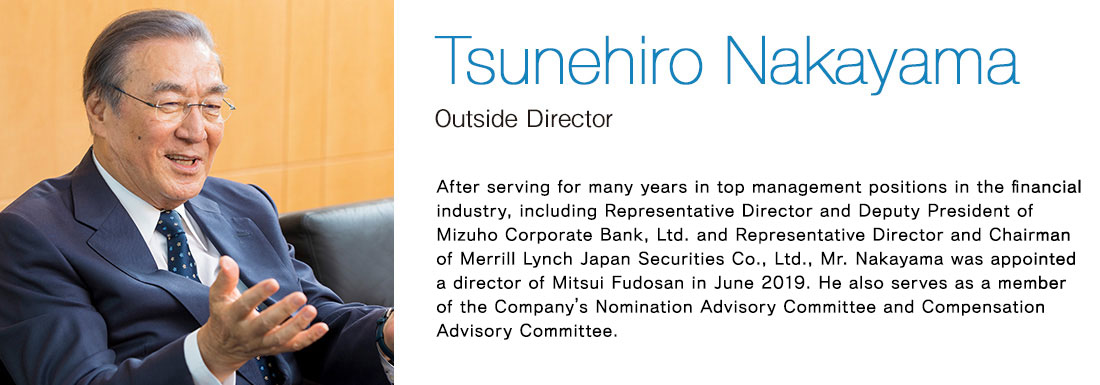
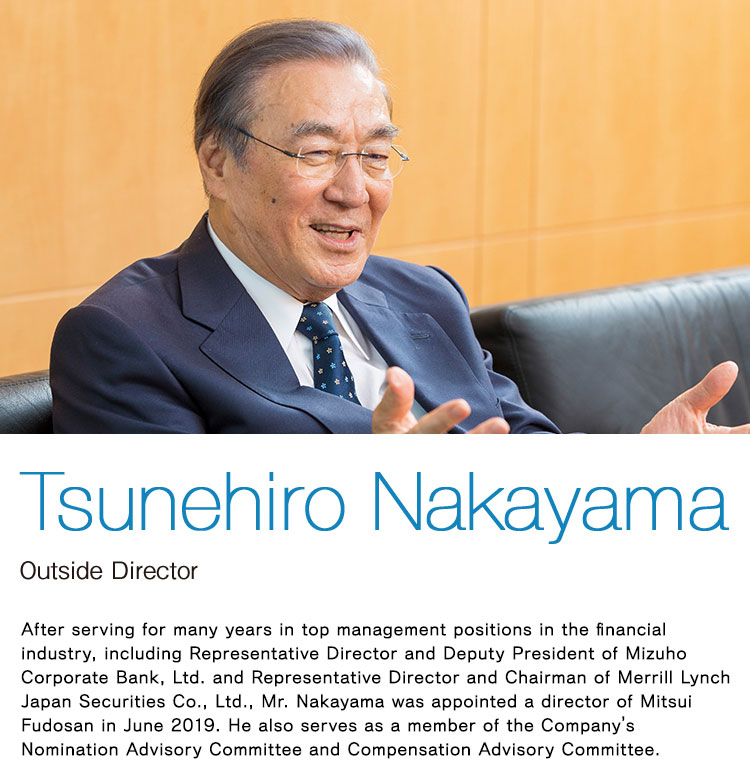
Evaluation of the Group’s ESG and Sustainability Initiatives
Mitsui Fudosan has identified diversity and inclusion (D&I) as well as decarbonization as key management issues and has pushed forward a host of ESG and sustainability initiatives to date.
How would you evaluate these initiatives and what are your thoughts on the issues the Company continues to face?
Kawai|Looking at the Group’s D&I gender initiatives, Mitsui Fudosan has added Mami Indo as an outside director and Mayo Mita as an outside auditor. The Company’s efforts to promote diversity over a short period of time is a reflection of the stance adopted by top management. In setting the direction for the entire Group, Mitsui Fudosan has identified D&I as one of the Company’s most important management issues. As such, every effort is being made to increase the ratio of women among internal officers. Indicative of its steady progress, Mitsui Fudosan was selected as a Nadeshiko Brand for the second consecutive year. In this regard, I believe the Company is moving in the right direction in a positive and timely manner. In addition to putting forward a specific road map in its bid to achieve net zero emissions in fiscal 2050, Mitsui Fudosan formulated the Mitsui Fudosan Group Biodiversity Policy in March 2023 and reaffirmed its commitment. As a commitment to the outside world, the Company’s policy and specific targets as well as the strong will of top management are to be highly commended.
Nakayama|Once again, I agree. As far as D&I is concerned, it is important that the Company has set clear numerical targets for the ratio of women in management positions at 20% and the ratio of female hires at 40% by 2030. To be honest, the real estate industry is not conducive to increasing the ratio of women, much like the construction industry. Since the number of past hires greatly influences the number of future candidates for management positions, the only way to increase the ratio of women in management positions is to increase the number of female mid-career hires at this time. Even under these circumstances, it is significant that the Company has clearly set out numerical targets. The same can be said of efforts aimed at achieving decarbonization. In addition to announcing numerical targets, 2022 has been identified as the first year for implementing the decarbonization action plan. I am impressed by how far the Company has come in such a short period of time. With the President taking the lead, top management convey their unwavering commitment, cognizant that deliberations by the Board of Directors and other meetings should not end simply with the establishment of the necessary structure and systems, but also extend to implementation plans. With this in mind, I believe Mitsui Fudosan’s commitment to the outside world is of the utmost importance.
Ito|Looking back around four years ago, I was adamant in expressing my opinion on the empowerment of women, asking why the number of female employees was so low. Recently, the Company has adopted a more proactive approach toward increasing the number of female mid-career hires, and I feel that they have been earnest in their implementation. In its efforts to promote decarbonization, Mitsui Fudosan is also to be commended for its serious endeavors, including the use of wind power and mega solar power generation. Despite the difficulties in addressing Scope 3 emissions, I am impressed by the Company’s efforts to move forward.
Nakayama|Nationality is a topic of increased discussion when it comes to D&I. Rather than limit these discussions to an individual’s country of birth, I feel there is a need to adopt a more comprehensive approach and to look at such factors as experience and skills. Earlier in my career, I worked for a U.S. company. At that time, we were very aggressive in our D&I endeavors. Diversity is not an automatic process, and requires each company’s strong commitment. With this in mind, there are those who believe Japan’s current efforts toward gender equality are belated. Other countries already boast a substantial track record and a high level of awareness. I am confident that Japan too can rapidly change in its efforts to promote gender equality in the future. From the perspectives of nationality and gender, deliberations should not be undertaken as a mere formality. Mitsui Fudosan must deliberate in depth on exactly what form of diversity it should pursue over the long term and take gradual steps toward achieving its goals.
Ito|As far as corporate governance is concerned, it is important that Mitsui Fudosan ascertain the structure and systems that best fit the Company rather than pursue the most advanced institutional design. From a positive perspective, Japanese-style management is deeply instilled in Mitsui Fudosan. In fact, the Company should have no qualms about this fact.
Kawai|The manner in which a company implements corporate governance is of the utmost importance. In this sense, I believe that Mitsui Fudosan is intuitively implementing the form of corporate governance that is best suited to it.
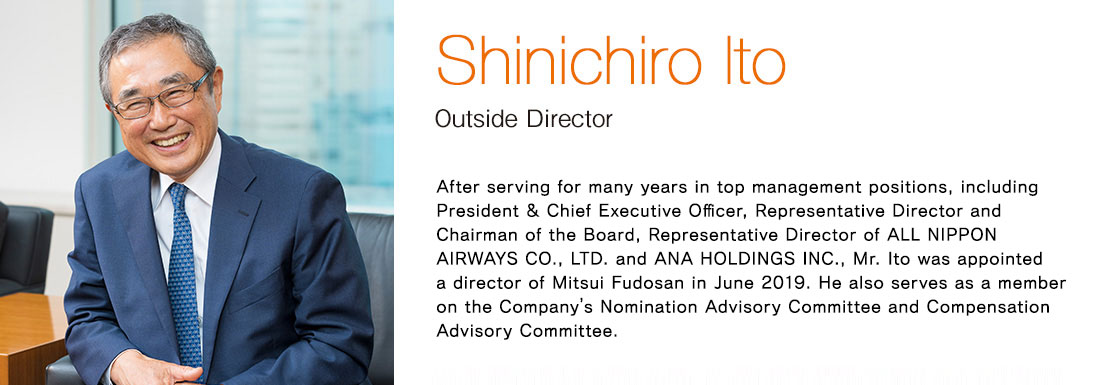
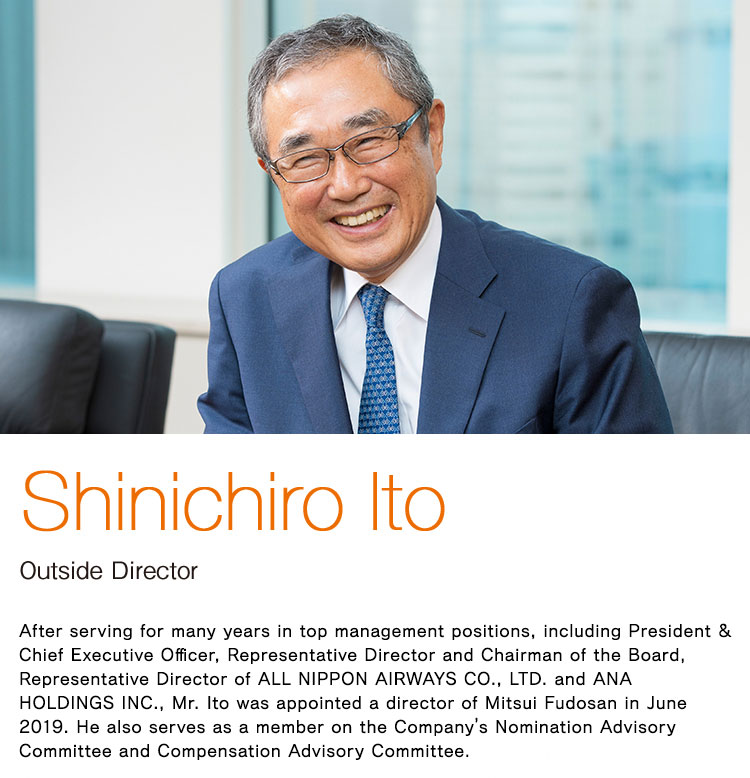
Expectations toward the New President
In closing, what are your expectations toward Mr. Ueda following his appointment as President and Chief Executive Officer?
Nakayama|As a company that engages in long-term projects, it is important that Mitsui Fudosan adopt a commensurate long-term perspective toward management and refrain from replacing its President on a short-term basis. I hope that as the Company’s new President, Mr. Ueda will put forward a new path when outlining his next management policy and work diligently to definitively and steadily implement various strategies and measures. Mr. Ueda has a sound track record as a developer that supports Japan’s industry and has actively promoted a significant number of projects in the past. Based on his wealth of experience, I have complete confidence in his ability to manage the Company in concert with Mr. Komoda in his role as Chairman. Mitsui Fudosan has recently renewed its management structure replacing four directors on its Board of Directors and three corporate auditors. Under the stewardship of the new President, Mr. Ueda, I look forward to the next stage of the Company’s transition.
Ito|Mr. Ueda has commented that imagination, initiative, and implementation have provided the impetus for the Company’s ongoing growth. He has gone on to say that Mitsui Fudosan will continue to move forward as an industrial developer or platformer, so to speak, beyond the boundaries of a real estate facilitator. Embodying Mr. Ueda’s vision and passion, the Nihonbashi Revitalization Plan, which is currently under way, aims to revitalize the city as an open platform for aerospace-related industries. Drawing on his past experience and various hardships as well as his transfer outside the Company to an investment advisory firm, Mr. Ueda boasts a broad perspective. Taking these factors into consideration, I look forward to his leadership.
Kawai|I believe Mr. Ueda has leveraged his various experiences outside the Company to generate new value through creative thinking. Guided by a renewed Board of Directors from the current fiscal year, I am confident Mitsui Fudosan will continue to exhibit generational diversification. Through reenergized communication with this younger generation and efforts to promote innovation grounded in diversity, amid an open corporate culture, I hold high expectations that Mitsui Fudosan will generate new business.
